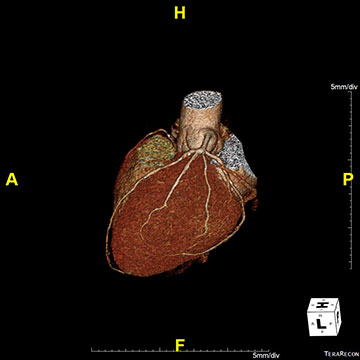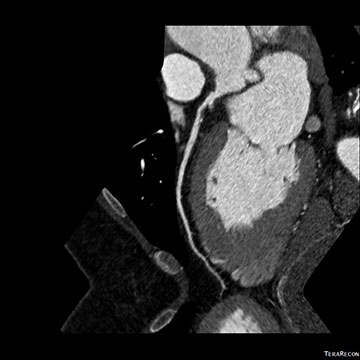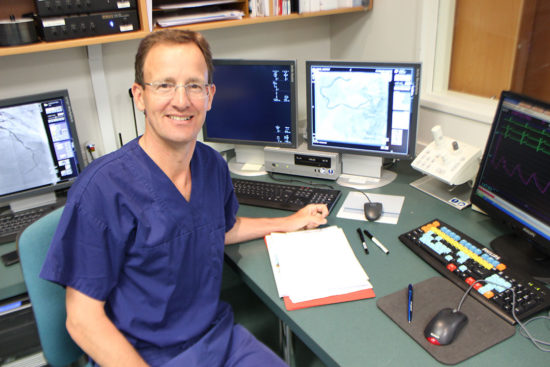Heart Scans
 CT Coronary Angiogram
CT Coronary Angiogram
CT coronary angiography arranged at Cardiology Specialists is where you sit inside a CT scanner and contrast is injected through a vein in the arm while you hold your breath. The CT scanner takes pictures of the heart arteries and then special software processes the images in time with your heart beat. The CT images can help rule out coronary disease, or show the extent of early cholesterol deposits (plaque) within the coronary arteries. Sometimes it can reveal more severe coronary narrowings. It is important that your heart rate is regular and slow to get good images. The presence of too much calcium or heart movement artifact can affect the image quality. This test is useful if the pain is atypical, you are at low to intermediate risk, and/or the exercise test is inconclusive. There is a small risk of radiation and allergy to contrast.
Dr Dougal McClean is a Southern Cross affiliated provider for CT coronary angiogram.
 CT Calcium Score
CT Calcium Score
CT Calcium Score arranged at Cardiology Specialists assesses amount of calcium present in coronary arteries. You sit inside a CT scanner and a quick X Ray of the heart vessels is obtained. The presence of calcium may help identify early coronary artery disease before the development of symptoms. The higher the calcium score as a population percentile the higher 5 year risk of a vascular event. A very low CT Calcium score suggests a low 5 year risk. A CT calcium score can be helpful to decide when to start cholesterol lowering statin treatment in patients with a high cholesterol, or identifying risk of heart disease in patients who do not know their birth parents.
Coronary Angiography
 Coronary angiography arranged at Cardiology Specialists is performed when you have symptoms which are suggestive of angina, and/or the exercise stress test is positive. In many cases, a stent can be inserted at the same time as the angiogram if a severe coronary narrowing is found, see: Stents.
Coronary angiography arranged at Cardiology Specialists is performed when you have symptoms which are suggestive of angina, and/or the exercise stress test is positive. In many cases, a stent can be inserted at the same time as the angiogram if a severe coronary narrowing is found, see: Stents.
Dr. Dougal McClean will explain the benefits and risks of the procedure and you will give informed consent. The procedure is performed at the Heart Centre, Cardiology Day Unit, St George’s Hospital. You may be instructed to take clopidogrel medication the night before to thin the blood (in addition to aspirin). You will be given some medication to relax you. Local anaesthetic is used to numb an area of skin in the forearm just above your wrist. A small tube is placed into an artery in the forearm and catheters are advanced through the blood vessels up to the heart. Dye is then injected so that the coronary blood vessels around the heart muscle can be seen on X-ray. Pictures of the coronary arteries in different projections are then obtained giving Dr McClean information about the state of your heart and the exact nature of any narrowed blood vessels.
